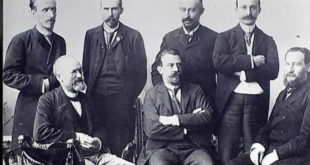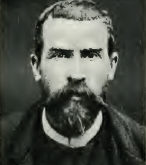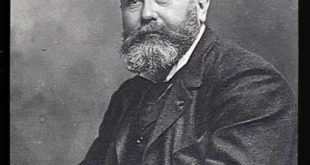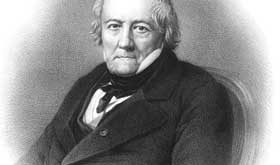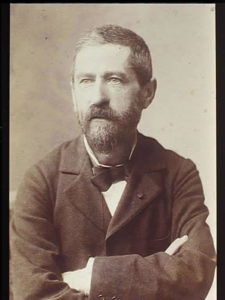
Born in the city of Aurillac (Auvergne Province), the firstborn son of a clerk, Émile Duclaux was brought up under his father’s tutelage until he reached the age for secondary school. During his years at the lycée his father kept pace with his son’s course work, which today would seem very controlling. But Émile did not resent his father; rather, the two were affectionately united in their pursuit of knowledge. He remembered fondly the trips they would take together across the volcanic mountains of his native land while discussing geology and history. From his father he also received a fluency in Spanish and learned to love classical literature. The father nurtured his prodigy and had in mind for him a degree from the École Polytechnique.
Émile Appert, his professor at the lycée, a pupil of Balard, taught him the beauty of mathematics, physics and chemistry. He urged young Émile to take up science. He applied himself diligently, astutely, and absorbed the enthusiasm of his professor. When he completed his secondary education it was apparent that a rural province would not suffice for his preparation into the elite schools. Reluctantly his father put his son’s genius ahead his own attachment and sent him to Paris where he might receive the best education.
Near the Latin Quarter of Paris was a small preparatory school under the supervision of a M. Barbet. It was here, 20 years prior, that Louis Pasteur had himself taken room as he prepared for the entrance exams. Before Pasteur this boarding school was of no significance; but after Pasteur, the school of the Impasse des Feuillantines had gained recognition. In 1859, Duclaux passed the examinations for both the École Polytechnique and the École Normale Supérieur. The quartermaster, M. Barbet, persuaded him to enroll in the latter, just as Pasteur had done.
Pasteur had recently taken a position at the École Normale as the sub-director of sciences. Duclaux was a fervent supporter of his methods and greatly admired the savant, then embarking on the study of spontaneous generation. In those early years with Pasteur, Duclaux grew fond of his master, especially after the loss of his father. The two were a lot alike: both were from rural country, both were of humble beginnings and both had a deep connection with their father, from whom they inherited their good judgment. Still more, both were known to be indefatigable in their pursuit to discover the secrets which nature had hidden.
In 1862, after completing his degree, Duclaux remained with Pasteur as a lab assistant. The make-shift laboratory of the Rue d’Ulm was very inadequate, but Émile did not complain, for he said that there with Pasteur, Raulin, and Gernez, a revolution in science was begun.
At 26 he was the youngest member of the Faculty. In late 1865 he was appointed to teach the lycée at Tours. This did not last long, for he put in a request to transfer to the Faculty of Clermont-Ferrand, near his home. He was surprised to find out that the position was offered to his close friend, Gernez, who he did not know had applied. The dilemma was resolved by Pasteur, who wished Gernez to come with him to Alais and Duclaux to teach chemistry.
For many years, he continued the researches begun at the Rue d’Ulm, corresponding with his mentor, while teaching about 100 students in the medical school. From these, he chose a select few to assist him in the laboratory. One such apprentice was Pierre Paul Émile Roux. Roux later said of him, in his biography of Duclaux, that he always knew how to comfort you. His nature was very much that of a teacher. He spoke with passion and maintained the attention of his students, full of imagery. He loved the youth and was watchful for young men of promise.
From there Duclaux was sent to Lyon to instruct. He had become prolific in many fields; he was a physicist, a chemist, a meteorologist, a geologist and he knew much about medicine. In 5 years time, he was elected to the Agronomic Institute in Paris, which he gladly accepted, thus bringing him closer to Pasteur. By then, 1878, his publications on ferments and microbes did much to persuade others of Germ Theory.
In Paris, Duclaux instructed at the Sorbonne while continuing his research on microbes. These years were gloomy and difficult as well as productive. With the death of his wife in 1881, he threw himself into his work. He slept little and suffered from boils for two years. During this time he focused on the dairy industry. He looked particularly at the role of enzymes and introduced new concepts and terminology in the scientific journals. He was awarded a gold medal by the Agriculture Society, who were benefiting greatly from his research. Later he produced a magnificent book, ‘Ferments et Maladies’ which he dedicated to his late wife who was taken by puerperal fever. The Agriculture Society awarded him a second gold metal for this work.
He was frustrated also by the obstinate physicians and surgeons who were reluctant to accept new theories. He denounced them because they stop learning once they receive a degree. Like Pasteur, he was a tenacious combatant; at times silent, and then explosive in throwing down a challenge. He stood beside that veteran soldier; hammer in hand, battering the edifice of traditions.
When Pasteur was debilitated by a second stroke in 1887, the members of his coterie sought a colleague who would gather together all the independent studies in Pasteur’s laboratory, to form solid doctrines. Because of his likeness to Pasteur, the members elected Duclaux to succeed to this role. Like Pasteur, he was contemplative and yet showed a love of life. He had that year initiated a journal to expand the collaborative work on microbes and pathology which he named, ‘Les Annales de l’Institut Pasteur.’ Shortly thereafter, the government passed a resolution to build an institute in gratitude to Pastuer, where his work would continue to benefit France. Pasteur saw the Institute as his own laboratory, where he could work in the direction he chose. Duclaux however, saw it more as an assembly for the greatest minds in the world, to work independently and discuss their theories.
When Pasteur died, Duclaux naturally assumed the position he had grown into. Across the globe, people sought out his advice. His journal grew so widespread that it consumed most of his time. His criticisms were just and he always kept from vanity, as Pasteur would have insisted. He was known to say that the most fruitful periods of science were those wherein dogmas are shaken.
 Pasteur Brewing Louis Pasteur – Science, Health, and Brewing
Pasteur Brewing Louis Pasteur – Science, Health, and Brewing 